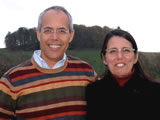
Together in Pain; Together in Hope
This article is written by
Dr. Maha El-Taji Daghash and Shiri Barr
Photo: April 2009


Photo: April 2009
JERUSALEM – Israel’s Independence Day and the Palestinian Nakba are two sides of the same coin. For over 60 years, Israeli Jews and Palestinian Arabs have engaged in opposite activities on that day. Jews celebrate the establishment of the State of Israel, while Palestinian Arabs commemorate "Al-Nakba", the day of their catastrophe. By its very nature, “Independence Day” suggests nostalgic celebrations for the winners and disregards the defeated, thus intensifying feelings of separation and estrangement. In light of this drastic gap between the feelings of Jews and Arabs, a unique grassroots project has provided an alternative: a space where it is possible for Jews and Arabs to come together in an inclusive event.
The first “Independence Day-Nakba Day Event” took place in 2003, and has since become an annual tradition. The event, which attracted 160 participants last year, is a unique and genuine encounter, designed to honour and commemorate the pain and loss on both sides. The timing of the event is challenging: it is a two-day residential workshop that takes place on the official consecutive dates of the Israeli Memorial Day and Independence Day. This conscious choice of timing sets the tone for reciprocity and mutual respect and allows participants to heal the feelings of separation and alienation.
As organizers, we have encountered resistance from both sides. Many Jews and Arabs, even those who regularly engage in Arab-Jewish dialogue, are reluctant to participate in an event with “Independence” and “Nakba” in the same title. “Invite me on any other day of the year,” is a common response. But it is exactly the challenge of holding these two opposites, and containing all the feelings they engender, which makes this event so important. It is exactly the specific timing of the encounter that makes it possible for participants to share their opposite narratives, bring their true feelings and participate fully.
Building on professional and grassroots experience, the workshop combines psychological, intellectual and experiential methodologies that allow participants to examine their personal and collective views and emotions regarding the conflict. It offers a supportive space to publicly share personal and family testimonies from both sides, and to grieve together for experiences of loss in a common, powerful memorial ceremony. People listen to a lecture given by a historian of the "Nakba" narrative and participate in inter-religious prayer. Diverse workshops are offered simultaneously, where participants are able to share their pain and also take responsibility for their part in the continuation of the conflict.
The integration of all these experiences enables participants to explore and challenge the perceived essence of their national identities. What is created is a deep encounter between the identities as well as individual transformational processes that lead to new perceptions of the conflict and daily reality, and to a wish to act for change. In a past event, the sharing of the personal story of a Palestinian who grew up as a refugee deeply touched a Jew who did not know about the realities of refugees and what it meant for Palestinians to not have a home. “Hearing this story from a Palestinian who, despite her difficult upbringing, had experienced a transformation in her relationship with Jews gave me hope and inspired me to continue in my peace work,” she said. A Palestinian participant was similarly moved by the story of a Jewish woman whose father lost his life while serving as an Israeli soldier when she was only five years old. “The fact that this woman was able to commemorate her father’s death by lighting a candle in his memory in a ceremony that also commemorated the loss of Palestinian lives filled me with respect and admiration,” said the Palestinian. In last year’s event, a woman put it succinctly when she joyously shared, just before the closing ceremony the following insight: “The true experience of Independence for me is that of being liberated from hatred and anger.”
“Independence” and “Nakba” are two sides of the same coin, because both Arabs and Jews call this land home, and both need to do the internal work necessary to manage existential fears and feelings of oppression and victimization. Both need to think of alternatives that will allow for mutual respect, freedom and equality for both sides. What excites us as organizers is that we are creating an occasion that is broader than the limitations set by particular historic events: a celebration of partnership, responsibility and inclusion.
Dr. Maha El-Taji Daghash is a Post-Doctoral Fellow in the Political Science
Department at Hebrew University and a certified Compassionate Listening
facilitator as well as a participant in the Mastery Foundation School for
Leadership. Shiri Barr is a Masters Degree Candidate in Conflict Transformation
from the SIT Graduate Institute in Vermont and a facilitator in Jewish-Palestinian
Dialogue.
Reprinted with permission from Common Ground News Service (CGNews), 23
April 2009, www.commongroundnews.org.